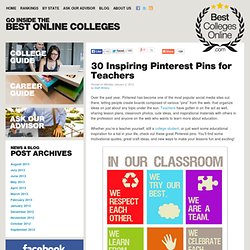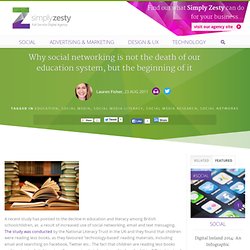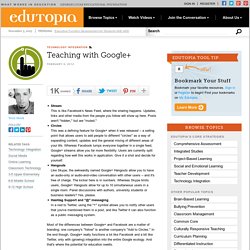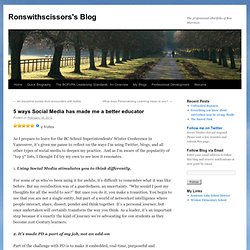

Path. TechCrunch’s Other Founder Previews Just.me, A Privacy-Focused Social Network. Pinterest. Social Media in Education - connect, share, learn, communicate and more. When we block social media we block learning. 30 Inspiring Pinterest Pins for Teachers. Posted on Monday January 2, 2012 by Staff Writers Over the past year, Pinterest has become one of the most popular social media sites out there, letting people create boards composed of various “pins” from the web, that organize ideas on just about any topic under the sun.

Teachers have gotten in on the act as well, sharing lesson plans, classroom photos, cute ideas, and inspirational materials with others in the profession and anyone on the web who wants to learn more about education. Whether you’re a teacher yourself, still a college student, or just want some educational inspiration for a kid in your life, check out these great Pinterest pins. You’ll find some motivational quotes, great craft ideas, and new ways to make your lessons fun and exciting! Classroom promisesThese classroom promises are inspirational to you and your students alike, whether they’re in grade school or high school. Learning through TwisterA whole new twist on Twister is found on this pin. Some creative ideas for using Popplet in the classroom.
Why social networking is not the death of our education system, but the beginning of it. A recent study has pointed to the decline in education and literacy among British schoolchildren, as a result of increased use of social networking, email and text messaging.

The study was conducted by the National Literacy Trust in the UK and they found that children were reading less books, as they favoured 'technology-based' reading materials, including email and searching on Facebook, Twitter etc.. The fact that children are reading less books and turning to digital is not really a surprise, but does it need to be a bad thing? Or is it instead a reflection of a shift in society as older forms of reading and writing make way for new, better technologies? Necessary skills The fact is that the skills younger people need to develop in order to function in everyday working life and society overall, extend beyond an ability to read a book. The golden age of knowledge Paul Carr recently wrote an article, in response to Jeff Bercovici's assertion that the "golden era of books is over".
Twitter. Teaching with Google+ Stream This is like Facebook's News Feed, where the sharing happens.

Updates, links and other media from the people you follow will show up here. Posts aren't "hidden," but are "muted. "Circles This was a defining feature for Google+ when it was released -- a selling point that allows users to add people to different "circles" as a way of separating content, updates and the general mixing of different areas of your life. Whereas Facebook lumps everyone together in a single feed, Google+ streams allow you far more flexibility. Users are currently split regarding how well this works in application. Most of the differences between Google+ and Facebook are a matter of branding: one company's "follow" is another company's "Add to Circles.
" Beginning Classroom Integration Of course, it is far more than a Facebook clone. 1) Basic: Communication The most basic way Google+ can function in your classroom is as an avenue of communication. 2) Intermediate: Project Management Tips Closing Tips. 5 ways Social Media has made me a better educator. As I prepare to leave for the BC School Superintendents’ Winter Conference in Vancouver, it’s given me pause to reflect on the ways I’m using Twitter, blogs, and all other types of social media to deepen my practice.

And as I’m aware of the popularity of “top 5″ lists, I thought I’d try my own to see how it resonates. 1. Using Social Media stimulates you to think differently. For some of us who’ve been using it for awhile, it’s difficult to remember what it was like before. But my recollection was of a guardedness, an uncertainty. 2. Part of the challenge with PD is to make it embedded, real-time, purposeful and collaborative. 3. Judy Halbert and Linda Kaser reminded me this week of James Britton’s famous assertion; “Reading and Writing float on a sea of talk”. 4. This is quite an amazing one, when you think about it. 5. Simple. I hope that resonates with you, and inspires you to take a few steps into this new and exciting world.
See you there! Like this: Like Loading...